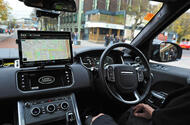Autonomous tech will cause new car sales to flatline from 2030 – report

New study suggests driverless cars will cause sales to "flat line"The rise of driverless car technology and ride sharing will prompt private car sales to go into decline, according to new research by Credit Suisse
A growth in use of fully autonomous vehicles could cause global new car sales to flatline from the year 2030, new research has suggested.
A study of the possible effects of driverless technology, car sharing and a growth in ride-hailing services on the automotive supply chain concluded that fewer people will need to purchase private vehicles, impacting the number of sales car makers achieve and therefore threatening business incomes if those car giants don't adapt.
The report, by financial services company Credit Suisse, stated: “Our global automotive production chain model forecasts global car production flatlining from 2030 with rising production in developing markets offset by declines in developed markets.
"Within that, we expect UK production levels to begin a structural decline from around 2030, falling about 1% per year from that year as autonomous vehicles comprise a greater proportion of the UK.”
The study cited the cheaper cost of transport offered by ride-hailing services compared with car ownership as a key driver for the shift, with the use of fully autonomous vehicles “being disproportionately found in developed markets such as the UK and owned by ride-hailing companies such as Uber”.
However, Credit Suisse also found that private car ownership will remain the cheapest option for transport in certain scenarios.
It calculated that a person travelling 5000 miles per year would spend £6536 per year if they used a private car, as opposed to £7992 if they travelled using a mix of ride-hailing apps for urban journeys and car rental for longer journeys. The figures include the cost of maintenance and assumes a used car costs £12,873 to buy – the current average price of a second-hand car in Britain.
The study predicted that autonomous cars will account for 14% of the new car market from 2040, with semi-autonomous models representing almost one third, meaning brands that most deftly shift to production of driverless models will be most likely to survive.
Highways England presents forecast for autonomous and connected cars on UK roads
Credit Suisse said that the growth of autonomous cars will affect used car buying websites. Even a modest 1.5% growth in self-driving vehicles would lead to fewer people having to buy cars and “have a profound impact on [the websites'] valuations” due to a reduction in car sales via their platforms.
More content:
New legislation to allow driverless cars on UK roads from 2021
Comments
Post a Comment